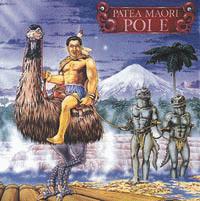Poi E (album)
1987 studio album by Pātea Māori Club From Wikipedia, the free encyclopedia
Poi E is an album released by New Zealand Māori music group the Pātea Māori Club. In 1984, the Māori language title track "Poi E" topped the New Zealand pop charts for four consecutive weeks, and was that year's biggest selling single - outselling all international recording artists.[1] The album also produced three other charting singles in New Zealand (Aku Raukura, Hei Konei Rā, and E Papa) but did not chart itself until nearly three decades after its original release.
| Poi E | ||||
|---|---|---|---|---|
 | ||||
| Studio album by | ||||
| Released | 1987 | |||
| Recorded | April 1983-December 1987 | |||
| Studio |
| |||
| Genre | Māori music, hip hop | |||
| Length | 47:29 | |||
| Label | WEA/Jayrem Records | |||
| Producer |
| |||
| Pātea Māori Club chronology | ||||
| ||||
| Singles from Poi E | ||||
| ||||
Dalvanius Prime, the album's producer and leader, was known for merging the styles of traditional Maori show bands and more recent Maori hip-hop.
Later, in the early 1990s, Poi E was produced as a Māori musical with additional songs, and in 2000, selections were performed in Sydney, at the Waitangi Day Concert.[2]
Development
Poi E was recorded almost entirely at Mascot Studios in Auckland over a four-year period from April 1983 ("Poi E") to December 1987 ("He Tangata Tini Hanga," "Ngakau Maru," and "Parihaka - Tewhiti - Tohu - Tawhiao"). The only exception was "Ngoi Ngoi," recorded at Marmalade Studios in Wellington.[3] Prime self-produced the album, financially supported by businesses in Pātea, after being rejected by record labels across New Zealand.[4]
Many of the album's songs are collaborations between Prime and lyricist Ngoi Pēwhairangi. The two began a musical partnership in 1982 after a meeting at Pēwharaingi's Tokomaru Bay home that was initially intended to last a day or two but ultimately went on for weeks due to the pair's songwriting chemistry.[5][6] "Ngoi Ngoi" - the opener of the second half of Poi E - is a tribute to Pēwhairangi written after her 1985 death, while the album's first side ("E Pa To Hau" to "Hei Konei Rā") traces the history of the iwi of Taranaki.[7]
Track listing
| No. | Title | Writer(s) | Length |
|---|---|---|---|
| 1. | "E Pa To Hau" | Traditional | 1:02 |
| 2. | "Ko Aotea" | Traditional | 0:53 |
| 3. | "Taranaki Patere - Kahuri" | Traditional | 2:59 |
| 4. | "Parihaka - Tewhiti - Tohu - Tawhiao" | Dalvanius Prime | 4:13 |
| 5. | "Nga Ohaki" |
| 2:21 |
| 6. | "Ngakau Maru" |
| 2:59 |
| 7. | "Hei Konei Rā" |
| 3:13 |
| 8. | "Ngoi Ngoi" |
| 4:25 |
| 9. | "He Tangata Tini Hanga" |
| 2:28 |
| 10. | "E Papa Waiari" | Traditional | 4:15 |
| 11. | "Aku Raukura" |
| 4:01 |
| 12. | "Poi E" |
| 3:51 |
| No. | Title | Writer(s) | Length |
|---|---|---|---|
| 13. | "Haeremai" | Tuini Ngāwai | 2:52 |
| 14. | "Kua Makona" |
| 2:51 |
| 15. | "Paikea" | T. Pēwhairangi | 2:19 |
| 16. | "Anei Ra Overture & Aria" |
| 5:27 |
Personnel
Summarize
Perspective
Credits adapted from the liner notes of Poi E.[3]
|
Musicians
|
Technical
|
Charts
References
External links
Wikiwand - on
Seamless Wikipedia browsing. On steroids.
